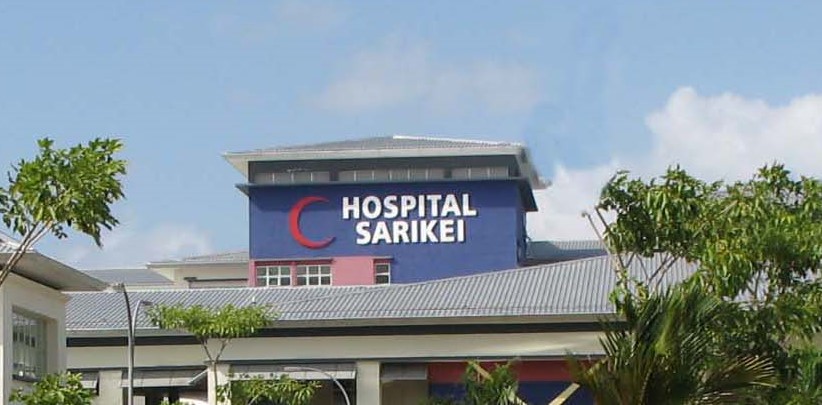KUALA LUMPUR, Oct 11 — The Sarikei Hospital management has addressed various complaints raised by a health care worker about the serious Covid-19 situation and overworked staff in the facility.
Sarikei Hospital director Dr Tey Siew Chang confirmed that hospital staff who are close contacts of positive Covid-19 cases, but are evaluated by the hospital’s occupational health and safety unit as low risk, will not be tested and instead be allowed to return to work.
“Whereas, workers identified as moderate or high risk will get tested either with antigen RTK (rapid test kit), PCR, or Molecular Test ID Now,” Dr Tey said in a statement last Saturday.
“If results are negative, the worker will be allowed to return to work.
Dr Tey was responding to an anonymous letter published by CodeBlue titled “The Hidden Truth Of The Hidden Island: Hospital Sarikei”, written by a health care worker calling themselves “Sarikeian Frontliners”.
The anonymous author complained that asymptomatic health care workers who are close contacts of positive cases were not swabbed, pointing out that more than 40 health care workers have contracted the coronavirus in Sarikei Hospital, a small district hospital in Sarawak.
“It happened not because we were careless or because we didn’t follow standard operating procedures — it was due to the slow response during an outbreak in the non-Covid ward,” the complainant wrote. “What will happen to the remaining staff? They will have to work more than 60 hours per week!”
The Sarikei Hospital staffer claimed that health care workers at the public hospital in Sarawak were so overworked and burned out that they wanted to be infected with Covid-19, just so they could take leave for 14 days.
Dr Tey responded that hospital management have never prevented staff from taking leave if “absolutely necessary”.
“In fact, each supervisor has been instructed to prepare appropriate work schedules that do not burden workers, besides ensuring that they have sufficient rest.”
She explained that medical officers on duty in Covid-19 wards and Covid-19 low-risk quarantine and treatment centres (PKRCs) take on-call duty every three days and that doctors would be given an off-day after on-call duty. Duty rosters are always reviewed, she said, depending on the Covid-19 situation and available medical officers in each department to ensure that doctors are not too exhausted. Medical officers from each department in Sarikei Hospital have been roped in to Covid-19 ward and PKRC duty by considering the minimum number of workers required.
The Sarikei Hospital complainant also pointed out that the Sarawak state health department instructed earlier this month for the antigen RTK to be used as a confirmatory test for Covid-19; however, allegedly, only Rt-PCR results are counted in official case tallies.
Dr Tey confirmed that Sarikei Hospital uses antigen RTK as a confirmatory test for the coronavirus, but did not address the claim that such results were excluded from official daily case numbers.
Daily Covid-19 cases in Sarawak fell from a peak of 5,291 on September 12 to 1,132 yesterday, amid a three-fold fall in testing from nearly 26,000 tests on September 6 to about 8,500 on October 8. Sarawak’s positive rate remains high at 17.2 per cent.
The Sarikei Hospital director did not directly address the anonymous health worker’s complaint about Covid-19 intensive care unit (ICU) capacity, but said that the facility’s Covid-19 ICU increased beds from four in April this year to six in June.
Last month, Covid-19 ICU capacity further rose to 18 beds, following increased admissions. Besides the ICU, Sarikei Hospital also operates two Covid-19 wards and three PKRCs. The three PKRCs have a combined capacity of 440 beds.
“Hospital management does not deny that there were previous problems involving the lack of or damaged facilities at SMK Meradong PKRC. However, each complaint received from patients at the PKRC were addressed and resolved immediately,” Dr Tey said.
“Besides the issue of a lack of facilities, workers at SMK Meradong PKRC also faced problems with a small number of patients who changed the position of their beds or sleeping accommodation,” she added.
The SMK Meradong PKRC was officially closed on October 3, while the Dewan Suarah PKRC started operations on the same date.
Dr Tey acknowledged the anonymous complainant’s claims about the deferral of non-emergency surgeries, explaining that hospital management decided to reduce elective operations starting March this year amid a surge of Covid-19 cases in Sarikei district.
“Besides that, management and treatment of non-Covid patients continue as usual and are always monitored to avoid congestion in wards and clinics.”
She also denied the Sarikei Hospital staffer’s claim that hospital workers had to buy infusion pumps or drip stands for patients, as the director maintained that the facility has never received any medical equipment from workers as alleged.
“Instead, Sarikei Hospital did receive contributions of medical equipment from elected representatives and non-government organisations (NGOs). Food contributions were also accepted from various parties and these were prioritised for workers in Covid-19 wards and PKRCs.”
Dr Tey did not address the Sarikei Hospital health worker’s claim that frontliners have only received one payment of the Bantuan Khas Sarawakku Sayang 6.0 2021 in August; the state government’s aid was promised to frontline workers for six months starting July.








